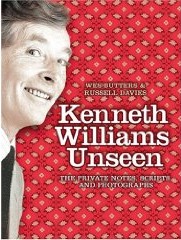
'Kenneth Williams Unseen' by
Wes Butters and Russell Davies
(London: HarperCollins Publishers, 2008. ISBN
978 0 00 728085 8. 276 pp. £20.00)
Kenneth Williams was as literary as his erudite excursions on Just
A
Minute might suggest, his fabled diaries being swiftly followed
by a volume of his letters (both edited by Russell Davies) in the years
1993-4. But, for nigh on the last 15 years Kenneth Williams fans have
had to be content with these hugely enjoyable volumes. Until now.
The story of how former DJ Wes Butters came to acquire much of the
material that forms Kenneth Williams Unseen is remarkable in
itself, consisting as it does of the vagaries of Fate combined with a
knowledgeably inquisitive mind. The upshot of Butters’ internet surfing
is an intriguing if at times drifting volume of (as the title suggests)
Kenneth Williams memorabilia that has never previously been published.
To offset what might have otherwise been a rather thin coffee-table
style book dealing with Kenneth’s death and at times unhappy life,
Butters (assisted by Russell Davies) weaves a narrative gleaned from
extensive interviews with those close to the comedian, helpfully
detailed in a ‘cast of characters’ at the start of the book. The
insight this offers is startling- the general consensus of opinion
being, for example, that Kenneth did not commit suicide (as has been
widely believed- see the clear implication in the reprinted Daily
Mirror article on page 24). In fact, it is the highly contentious
subject of Kenneth’s final hours that opens the book proper after a
typically informative introduction by Russell Davies.
The structure of Kenneth Williams Unseen is an interesting one,
for it posits 9 chapters (= 9 divisions) of a life that could easily
have been split into just five (early years, Army life, radio, films
and television). Although the titles do not give too much away (‘The
Man Who Taught Him Comedy’ for example), the contents help to flesh out
the picture of a man made familiar by the familiar- gone are
the usual portraits and hackneyed images that have been frequently
reprinted and which have found their way onto souvenir mugs in rather
dubious taste. Instead, to compliment copies of key documentation (such
as Kenneth’s Will, passport and script extracts), a range of more
unusual photographs (such as the on-set pictures from Carry On
films, plays and even the Comic Roots programme) support the
text. If anything, it is sometimes the use of the illustrative material
that undermines the text (for example, the reference to 7 Keys To
Baldpate that accompanies the script extracts on pp. 65-66 is
unfortunate- the extracts belong instead to Alladdin [sic.].
Although the book is largely chronological, the illustrations are not.
It is thus extremely disconcerting to find Kenneth talking to children
on the streets in the 1980s (a superb colour photograph on page 99)
closely followed by pictures from Some You Win from a similar
time period before a lovely vintage Army group picture confronts the
eyes on page 116. It is this which makes orientating oneself around Kenneth
Williams
Unseen a little like steering a ship without a map- you
think you are probably going in the right direction but would welcome a
landmark or two to confirm your assumption. However, to hold a charge
of inept geography at Butters’ book would be churlish in the extreme.
True, it is neither traditional nor conventional in its approach, but
it is, like much of Kenneth’s work, a delightful pot pourri of visual
stimuli and revealing insight. Perhaps the most significant thing about
the comments that accompany many of the remarkable images are their
anecdotal ordinariness. Thus, Eric Merriman’s account of a party (page
154) or Peter Rogers’ comment that Kenneth ‘couldn’t do two things at
once. He couldn’t answer the phone and talk to you’ (p.214) are now
captured for posterity. It is these words which help to create a more
rounded portrait of Kenneth Williams- the comedian, the entertainer,
the man.
Kenneth Williams Unseen is a creditable addition to the Williams
canon and also a volume of some detail (it runs to 276 pages including
a thorough index). What the book does perhaps more than anything is
keep the spirit of the man alive.
In essence, it ultimately comes to resemble a visual This Is Your
Life, but sadly devoid of its subject in the flesh to react in
semi-outraged mock surprise as another unexpected memory from a past
friend or colleague amuses the audience. The comments that are
sprinkled in the ‘wit and wisdom’ section towards the end of the book
are sometimes familiar, sometimes new- but always interesting. Kenneth
himself commented that ‘I wonder if anyone will ever touch the things
that were once a part of my life and ask themselves what manner of man
I was’. Now, thanks to Wes Butters, we all have the opportunity to get
as close as most of us will ever get to doing just that.
'Kenneth Williams- Unseen' is published by HarperCollins.
HarperCollinswebsite
Back
Home

